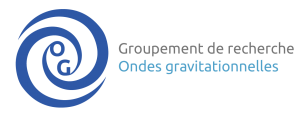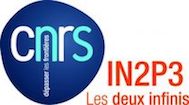Sixième Assemblée Générale du GdR Ondes Gravitationnelles
Amphi 2
Université Paul Sabatier

Le GdR Ondes Gravitationnelles (http://gdrgw.in2p3.fr/) a été renouvelé cette année, à partir de celui crée en 2017. Il a le but de rassembler la communauté scientifique intéressée par l’exploration de l’Univers avec les ondes gravitationnelles, et de lui fournir des occasions de rencontres et de discussions communes.
La sixième assemblée générale du GdR Ondes Gravitationnelles se tiendra en présence au Laboratoire des deux Infinis - Toulouse, et couvrira les thèmes d’intérêt du GdR, représentés par ses Groupes de Travail.
Nous encourageons vivement la participation en présence. L'événement sera retransmis, lien à suivre.
L'inscription à cette réunion est obligatoire avant le 7 septembre 2022. Il faut, au préalable, devenir membre du GdR en s'inscrivant sur le site http://gdrgw.in2p3.fr/
La date limite pour envoyer une contribution est le 7 septembre 2022.


-
-
13:30
Inscriptions et café
-
Introduction par le directeur du L2IT
-
LISA science: Natalia Korsakova.
-
Groupe de Travail: POPULATIONS DES SOURCES
-
1
Are binary black hole mergers and long 𝛾-ray bursts drawn from the same black hole population?Orateur: Benjamin Arcier (IRAP)
-
2
Spin--model comparison with GWTC-3 for isolated binary black holeOrateur: Carole Perigois
-
3
Understanding the progenitor environment of binary black holesOrateur: Rahul Srinivasan (Universite Cote d'Azur)
-
4
Using Machine Learning to predict the evolution of massive binariesOrateur: Julien Marchioro (APC - Gravitation)
-
1
-
Pause café
-
Athena and LISA synergies: Natalie Webb
-
Groupe de Travail: PRÉDICTION ET SUIVI DES SIGNAUX MULTI-MESSAGER
-
5
The SVOM missionOrateur: Jean-Luc ATTEIA (IRAP - CNRS/UPS/CNES)
-
6
Enabling multi-messenger science with Fink : current status and future developmentOrateur: Roman Le Montagner
-
7
Predicting GW candidates source properties in low-latency with MBTA during O4Orateur: Dimitri Estevez ({CNRS}UMR7178)
-
8
Multimessenger prospects for massive black hole binaries in LISAOrateur: Alberto Mangiagli (APC)
-
9
Studying gravitational wave emission from tidal disruption eventsOrateur: martina toscani (L2I Toulouse, CNRS/IN2P3, UT3)
-
5
-
Cocktail de bienvenu
-
13:30
-
-
Eleonora Capocasa. LIGO-Virgo-KAGRA network: state of the art and future plansPrésident de session: Eleonora Capocasa
-
Groupe de Travail: ÉTOILES A NEUTRONS, SUPERNOVÆ ET SYNTHÈSES DES ÉLÉMENTS LOURDS
-
10
GW and electromagnetic observations of NS to constraint the dense matter EoSOrateur: Sebastien Guillot (IRAP)
-
11
Multi-messenger signatures of fluid instabilities in magnetised core-collapse supernovaOrateur: Matteo Bugli (CEA - Saclay)
- 12
-
13
Contraints on NS kicks in HMXB with Gaia EDR3Orateur: Francis Fortin (APC)
-
10
-
Pause café
-
Nicolas Leroy: The SVOM MissionPrésident de session: Nicolas Leroy (IJCLab IN2P3/CNRS)
-
Discussion: Table ronde sur la publication des données - Eric Chassande-Mottin, Antoine Petiteau, Ed Porter
-
Déjeuner au buffet
-
Groupe de Travail: FORMES D’ONDE S
-
14
Recent progress in waveform modelling using perturbation theoryOrateur: Andrew Spiers
-
15
Post-Newtonian waveform: a state of the artOrateur: François Larrouturou (IAP)
-
16
LISA parameter estimation for GW190521-like binaries in an AGN orbitOrateur: Sylvain Marsat (L2I Toulouse, CNRS/IN2P3)
-
14
-
Science objectives with the Einstein Telescope: Micaela OertelPrésident de session: Micaela Oertel (LUTH, Observatoire de Paris)
-
Pause café
-
Groupe de Travail: TESTS DE LA RELATIVITÉ GÉNÉRALE ET THÉORIES ALTERNATIVES
-
17
Effective two-body approach to the three-body problemOrateur: Adrien Kuntz (Scuola Normale Superiore)
- 18
-
19
Constraining spontaneous black hole scalarization with gravitational wavesOrateur: Leong Khim Wong (IPhT, Université Paris-Saclay)
-
17
-
Groupe de Travail: COSMOLOGIE
-
20
Latest O3 cosmology results from the LVK, and current and future constraints on cosmology and modified gravitational wave friction from binary black holesOrateur: Konstantin Leyde (APC Université Paris Cité)
-
21
Constraining the cosmic expansion history with LISA standard sirensOrateur: Dr Danny Laghi (CNES, L2I Toulouse, CNRS/IN2P3, UT3)
-
22
Constraints on cosmic strings from PTAOrateur: Hippolyte QUELQUEJAY LECLERE (APC)
-
20
-
-
-
Quentin Beaufils: MIGA - a test bench for gravitational wave observation with cold atom interferometersPrésident de session: Quentin Beaufils (LNE-SYRTE, Observatoire de Paris, Université PSL, CNRS, Sorbonne Université, 61 avenue de l’Observatoire 75014 Paris)
-
Groupe de Travail: DEVELOPPEMENT DES DETECTEURS
- 23
- 24
-
25
Préparation de la calibration d'AdvancedVirgo+ pour le run O4Orateur: M. Paul Lagabbe (LAPP)
-
Pause café
-
Stephen Green: Simulation-based inference for gravitational wavesPrésident de session: Stephen Green (Albert Einstein Institute Potsdam)
-
Groupe de Travail: MÉTHODES D’ANALYSE DES DONNÉES
-
26
On-going improvements in the Virgo strain h(t) reconstruction and online noise subtraction in preparation for the O4 runOrateur: Monica Seglar-Arroyo (L.A.P.P.)
-
27
Learning-based models for gravitational wave analysisOrateur: Elie Leroy (DRF-IRFU)
-
28
Exploring dimensionality reduction and random projections for gravitational wave astronomyOrateur: Thomas Sainrat (CentraleSupélec)
-
29
Impact of correlated seismic and correlated Newtonian noise on the Einstein TelescopeOrateur: Kamiel Janssens (ARTEMIS, Nice; University of Antwerp, Belgium)
-
26
-
Conclusions
-